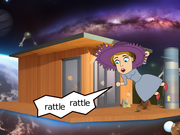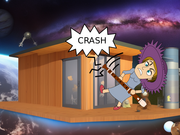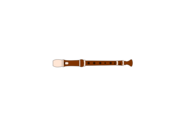Mnemonic comic for 亠
Mnemonic
Mnemonic symbol: 亠 looks like a beret. Tecumseh (t) is killing time in the Outhouse's kitchen (ou2) by playing a game. His goal is to blow a petal leaf (丶) into a beret (亠) by blowing air through a flute (一).
亠 character breakdown
one / single / a (article) / as soon as / entire; whole; all; throughout / "one" radical in Chinese characters (Kangxi radical 1) / also pr. [yao1] for greater clarity when spelling out numbers digit by digit
Maud Younger (y) forgot her keys to the space station (Ø1), all she brought outside was her flute (一). She has no choice but to crash the door with the giant flute.
"dot" radical in Chinese characters (Kangxi radical 3) / see also 點|点[dian3]
This character shall be represented by a petal (丶) when appearing in other characters.
Julian Giant Squid (zhu) is napping in the space station's living room (Ø3) and hugging a petal (丶).
Julian Giant Squid (zhu) is napping in the space station's living room (Ø3) and hugging a petal (丶).
Characters with 亠 as component
language / culture / writing / formal / literary / gentle / (old) classifier for coins / Kangxi radical 67
文
=
乂
+
亠
:
Mnemonic symbol: a thick book.
Willy Walrus (w) wants to cook in the encampment's kitchen ((e)n2). The recipe book (文) is extremely greasy and Willy doesn't want it to touch anything, nor touch it. That's why he puts it into a beret (亠) so that it doesn't touch the floor, and uses pliers (乂) to turn the pages.
Willy Walrus (w) wants to cook in the encampment's kitchen ((e)n2). The recipe book (文) is extremely greasy and Willy doesn't want it to touch anything, nor touch it. That's why he puts it into a beret (亠) so that it doesn't touch the floor, and uses pliers (乂) to turn the pages.
abbr. for Beijing / surname Jing / Jing ethnic minority
capital city of a country / big / algebraic term for a large number (old) / artificial mound (old)
京
=
亠
+
口
+
小
:
Mnemonic symbol: Beijing is China's capital, and a characteristic landmark of Beijing is the building called the underpants. Joan of Arc (ji) is trying out Beijing's large underpants (京) in front of the engine ((e)ng1). The underpants have a nice pattern consisting of paintings of berets (亠), mandarins (口) and daisies (小).
six / 6
"house on a cliff" radical in Chinese characters (Kangxi radical 53), occurring in 店, 序, 底 etc
wide / numerous / to spread
广
=
亠
+
丿
:
The English Wiktionary lists "canopy" as a possible meaning, and an example for a canopy is the upper part of a parachute. That's what I'll use to represent this character in other characters. In the anglepod, Gitta Giraffe just invented the art of building a parachute out of berets and bananas, using the berets as canopy and banana peels as strings. Soon, this new sport spreads all over the world as the new thing to do.
广
=
亠
+
丿
:
The English Wiktionary lists "canopy" as a possible meaning, and an example for a canopy is the upper part of a parachute. That's what I'll use to represent this character in other characters. In the anglepod, Gitta Giraffe just invented the art of building a parachute out of berets and bananas, using the berets as canopy and banana peels as strings. Soon, this new sport spreads all over the world as the new thing to do.
to hand over / to deliver / to pay (money) / to turn over / to make friends / to intersect (lines) / variant of 跤[jiao1]
words / speech / to say / to talk
言
=
亠
+
二
+
口
:
Maud Younger rushes into anthill and in the kitchen she uses a megaphone to loudly announce that the world revolution will soon start. She also tells the people that she has berets for everyone so that everyone will be able to be in style for the revolution. However she doesn't tell that she prepared the berets in another way: to each beret, she attached a mandarin via two capacitors which forms a formidable antenna, so that after the revolution, she'll be able to transmit her speeches directly to the wearers' brains.
Words with 亠
亠
is not used as a character in a word.
Sentences with 亠
亠 currently does not appear in any sentence.








